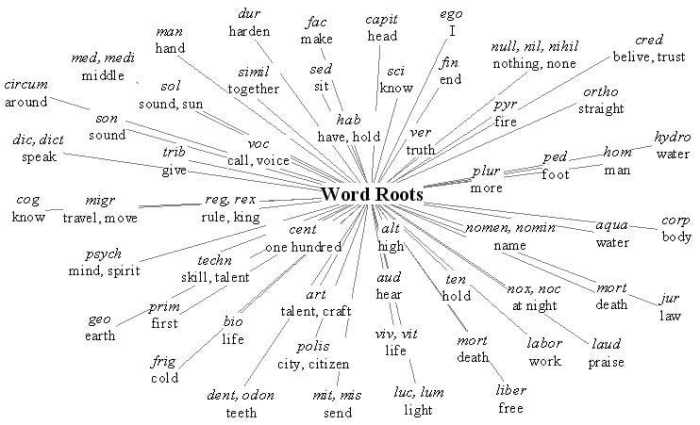Words with the root ject, such as project, reject, and inject, offer a diverse and compelling exploration into the realm of language. Their etymological origins and nuanced meanings have shaped their usage across various contexts, inviting us to delve into the fascinating world of word origins and their practical applications.
From the Latin root “jacere,” meaning “to throw,” these words have evolved to encompass a wide range of concepts, from the tangible act of throwing an object to the abstract notion of casting an idea or opinion.
Definitions
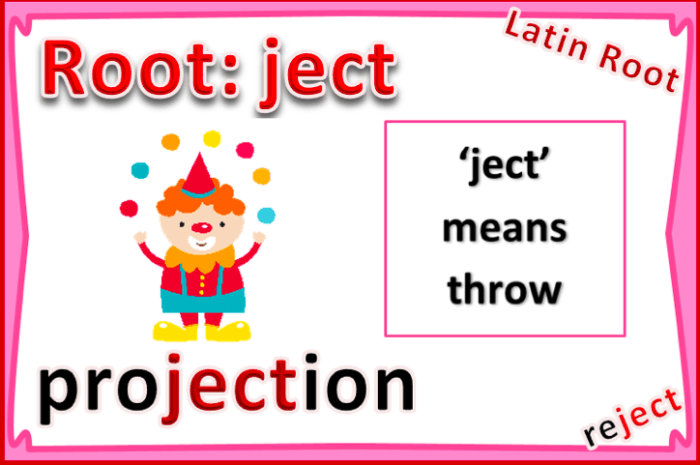
The root word “ject” comes from the Latin word “jacere”, which means “to throw”. It has several different meanings and connotations, including:
Meanings and Connotations
- To throw or cast something
- To direct or aim something
- To put or place something
- To cause or produce something
- To reject or cast aside something
Etymology: Words With The Root Ject
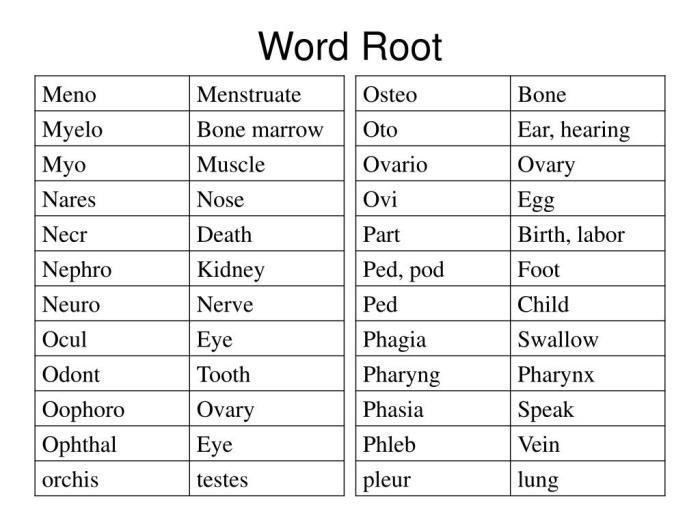
The root word “ject” has a long and fascinating history, dating back to the Latin word “jacere,” meaning “to throw.” Over time, the word has evolved to take on a variety of meanings, all of which relate to the idea of throwing or casting.
Latin Origins, Words with the root ject
The Latin word “jacere” was first used to describe the act of throwing an object. However, it soon came to be used more broadly to refer to any kind of casting or sending forth. For example, the word could be used to describe the casting of a fishing line or the sending of a message.
The root “ject” conveys ideas of throwing or casting. In literature, it’s often used to describe characters who play a pivotal role in shaping events. If you’re a fan of “The Catcher in the Rye,” test your knowledge with this comprehensive catcher in the rye quiz . It’ll challenge your understanding of Holden Caulfield’s world and the complex relationships he navigates.
Don’t forget to delve into other words with the root “ject” to uncover their nuanced meanings in different contexts.
Evolution in English
When Latin was adopted into English, the word “ject” took on a more specialized meaning. It came to be used primarily to refer to the act of throwing or casting something away. This meaning is still reflected in words like “eject” and “reject.”
Modern Usage
In modern English, the root word “ject” is still used to refer to the act of throwing or casting something away. However, it has also taken on a number of other meanings. For example, the word can be used to describe the act of projecting something or the act of objecting to something.
Usage
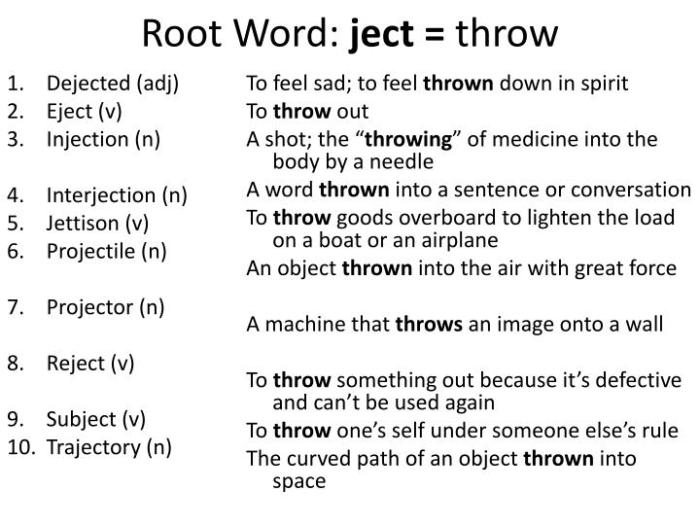
The root word “ject” is used in a variety of contexts, including medicine, science, and law.
In medicine, “ject” is often used to refer to the process of injecting a substance into the body. For example, a doctor might inject a patient with a vaccine or medication.
Grammatical Functions
The root word “ject” can function as a verb, a noun, or an adjective.
- As a verb, “ject” means to throw or cast something.
- As a noun, “ject” refers to something that is thrown or cast.
- As an adjective, “ject” means thrown or cast.
Related Words
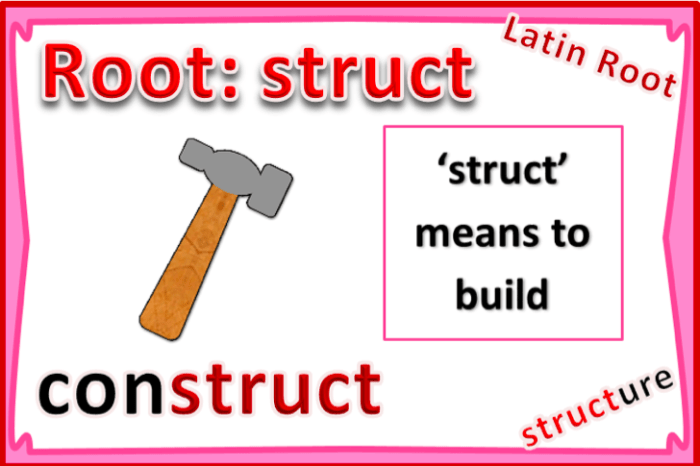
The root word “ject” gives rise to a family of words that share a common semantic field related to throwing, casting, or projecting.
These words include:
- Eject: To throw or force out.
- Inject: To force (a liquid or gas) into something.
- Interject: To insert (a word or remark) into a conversation.
- Object: To express opposition or disagreement.
- Project: To throw or send forward.
- Reject: To refuse to accept or acknowledge.
- Subject: To place under the authority or control of another.
Relationships between Words
The words in this family share a common root meaning of “to throw” or “to project.” This shared etymology is reflected in their semantic relationships.
For example, “eject” and “inject” both involve the act of throwing or forcing something into or out of something else. “Interject” involves the act of throwing or inserting a word or remark into a conversation. “Project” involves the act of throwing or sending something forward.
“Reject” involves the act of throwing or pushing something away.
These words can also be used in a figurative sense. For example, “object” can be used to express opposition or disagreement, and “subject” can be used to place someone or something under the authority or control of another.
Applications
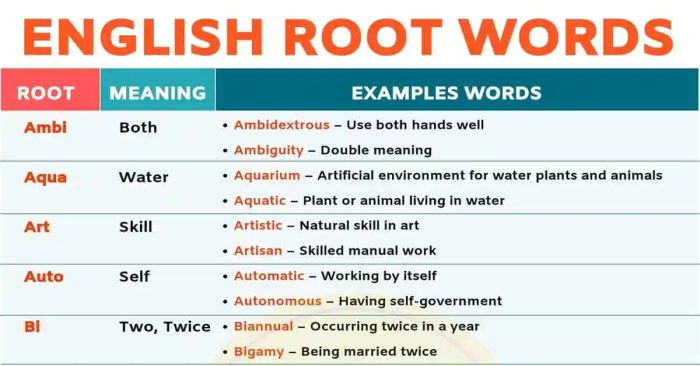
The root word “ject” offers versatile applications in diverse fields, enabling precise communication and enhancing our understanding of various concepts.
In the realm of science, “ject” serves as a cornerstone for terms related to throwing or propelling objects. For instance, the word “projectile” describes an object launched into the air, while “eject” denotes the forceful removal of something from a confined space.
Enhancing Communication
Beyond scientific contexts, the root word “ject” also plays a crucial role in enhancing communication. Words like “reject” and “object” convey clear and concise messages, expressing disapproval or opposition.
Moreover, “ject” helps us articulate concepts related to influence and control. “Subject” refers to an individual or entity under authority, while “interject” denotes the act of inserting a remark into a conversation.
Clarifying Questions
What is the origin of the root word “ject”?
The root word “ject” originates from the Latin verb “jacere,” meaning “to throw.”
How has the meaning of “ject” changed over time?
Over time, the meaning of “ject” has expanded to encompass not only the physical act of throwing but also metaphorical concepts such as casting an idea or opinion.
What are some common words that share the root “ject”?
Some common words that share the root “ject” include project, reject, inject, and subject.
